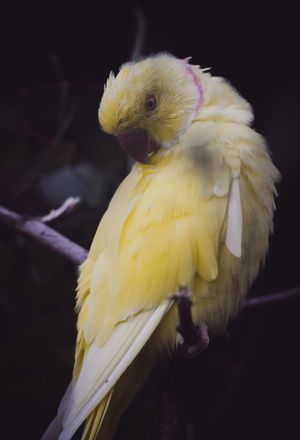
Psittacine Beak and Feather Disease (PBFD) is caused buy a DNA circovirus. This virus is easily transmissible via feather dust and feces and remains infective in the environment for up to 1 year. Transmission from mother to offspring can also occur through the egg. This virus targets rapidly dividing cells such as epithelial cells, GI tract, and the immune system. All parrots, lorikeets and cockatoos are susceptible to this virus, with the most common species infected being lovebirds and Indian ringneck parakeets. PBFD has both an acute and chronic form. The acute form affects mostly nestling and fledgling birds while the chronic form is most common in birds over 6 months of age.
Symptoms of the acute form include depression, green diarrhea, abnormal feather growth, pale mucous membranes, decreased or absent appetite, regurgitation, and death. The chronic form causes bilaterally symmetrical feather abnormalities and loss, thickening of the skin, overgrowth of the beak, and oral ulcers. Some birds become almost entirely naked with this virus. Secondary infections are common in birds with this virus due to immunosuppression.
Infection from this virus can be determined by either detection of viral DNA using PCR testing or detection of antibodies to the virus in the blood. Your veterinarian may also recommend a complete blood count and serum biochemistry to evaluate the overall health of the bird.
There are no medications that directly treat this virus and infection is lifelong. Because of this, treatment focuses on supportive care with fluid therapy, assisted feeding, and treatment of any secondary infections. In patients where the beak is affected, pain medications may be warranted.
Infected birds should be in quarantine for life and never be used for breeding. New birds should be quarantined in a separate air space from existing birds. Minimize contamination of food. Test birds both initially and then again in 90 days.
The prognosis depends on the severity of clinical signs. However, lorikeets and Eclectus can develop protective antibody titers and stop virus excretion but lifelong quarantine of these birds is still recommended.
Copyright © All Rights Reserved
